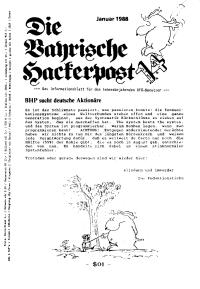Copy Link
Add to Bookmark
Report
Cider Digest #1599

Subject: Cider Digest #1599, 7 December 2010
From: cider-request@talisman.com
Cider Digest #1599 7 December 2010
Cider and Perry Discussion Forum
Contents:
Organic Chemistry Question (Peter Hoover)
Re: ice cider (Claude Jolicoeur)
Re: Cider Digest #1598, 4 December 2010 (Eden Ice Cider)
Bottle Bombs While Pasteurizing ("Kevin Luke")
A Question for Digestion on Headspace ("drcath@tiac.net")
NOTE: Digest appears whenever there is enough material to send one.
Send ONLY articles for the digest to cider@talisman.com.
Use cider-request@talisman.com for subscribe/unsubscribe/admin requests.
Archives of the Digest are available at www.talisman.com/cider#Archives
Digest Janitor: Dick Dunn
----------------------------------------------------------------------
Subject: Organic Chemistry Question
From: Peter Hoover <prh4@cornell.edu>
Date: Sat, 4 Dec 2010 07:28:39 -0500
Hi folks,
I've been making hard and sweet cider for about 40 years, on a
strictly amateur basis. Lately I've tried my hand at pommeau, a
mixture of fresh sweet cider and alcohol. When I add enough alcohol to
the cider to bring it up to a final strength of about 15% and prevent
fermentation, the combination stays cloudy for a while, and them
begins to fall bright, with clumps of cottony white stuff very slowly
dropping to the bottom of the container. What is going on here
chemically? I look forward to your responses.
Peter
Peter R. Hoover, prh4@cornell.edu
------------------------------
Subject: Re: ice cider
From: Claude Jolicoeur <cjoli@gmc.ulaval.ca>
Date: Sat, 4 Dec 2010 11:50:53 -0500
In Cider Digest #1598, 4 December 2010
>Subject: Ice Cider
>From: Thom Mitchell <thommitch@gmail.com>
>One of the places I get my grape-based wine from is importing an Ice Cider
>from Canada into the US, it's retailing for $30 a 375ml bottle. Has anyone
>on the list had or made an Ice Cider? Just curious about the process; as
>well as what the freezing of the picked apples does to the flavor, joice and
>sugar profiles. Is this something can be done artifically? Has anyone on the
>list done this? If so I'd be interested in your experience and thoughts.
You will get some additional information from this page:
http://www.lafacecachee.com/cidredeglace_en.html
Essentially, you need to freeze-concentrate the juice up to brix 30, then
ferment. The main difficulty for amateur cidermakers is to stop the
fermentation when about half the sugars have fermented (i.e. at about SG
1.060) and then stabilise it. Usually the fermentation is stopped by the
cold, and stabilisation either by micro-filtration or pasteurisation, both
of which require equipment that are not usually found in an amateur's cider
shop...
I plan to try one day to make a keeve with concentrated juice. After a good
keeve, possibly the fermentation would stop by itself at the right moment
and the cider remain stable. As far as I know, this has never been done.
I should add that a good plain keeved cider is just as good if not better
than an ice cider... It will not be quite as sweet, nor rich in alcohol
however. In any case, if you never had an ice cider before, go fot it - it
is overpriced, but I guess it is worth the experience!
Claude Jolicoeur, Quebec.
------------------------------
Subject: Re: Cider Digest #1598, 4 December 2010
From: Eden Ice Cider <leger@edenicecider.com>
Date: Sat, 4 Dec 2010 13:19:25 -0500 (EST)
Hi there -
In response to the following post -
- -------------
Subject: Ice Cider
From: Thom Mitchell <thommitch@gmail.com>
Date: Thu, 2 Dec 2010 15:26:58 -0500
One of the places I get my grape-based wine from is importing an Ice Cider
from Canada into the US, it's retailing for $30 a 375ml bottle. Has anyone
on the list had or made an Ice Cider? Just curious about the process; as
well as what the freezing of the picked apples does to the flavor, joice and
sugar profiles. Is this something can be done artifically? Has anyone on the
list done this? If so I'd be interested in your experience and thoughts.
Thanks, Thom
- -------------
Answer -
There are a number of emerging ice cider producers here in
Vermont, just across the border from Quebec.? In actuality,
the vast majority of Quebec ice cider is made by freezing
the juice outside, rather than freezing apples. Both methods
are allowed by the Quebec government labeling regulations
for ice cider, however those regulations do require the use
of natural cold.? In the US there are no recognized
requirements. It's tough to get TTB approval - they want you
to call it sweet apple wine.? I'm happy to discuss what
we've learned so far in 3 years of commercial production -
Eleanor Leger
Eden Ice Cider Company
www.edenicecider.com
There is information about the process at
and www.edenicecider.com/abouticecider.html
------------------------------
Subject: Bottle Bombs While Pasteurizing
From: "Kevin Luke" <kluke@amerytel.net>
Date: Sun, 5 Dec 2010 10:19:35 -0600
I have had good success bottling carbonated apple juice and cider in
Corny kegs. When I bottle, I use a racking cane with a drilled stopper.
The racking cane fits perfectly into a cobra tap (frugal guy's counter
pressure filler). I put the cane in the bottle and make sure the stopper
is snug and open the tap. Squeezing the stopper relieves pressure, and the
bottle is filled ALMOST as well as it would be with a very expensive filler.
That is not the reason for my post, but I noticed folks have been talking
about sparkiling cider lately so I thought I would share what I do.
Once bottled, my troubles begin when I attempt to pasteurize the carbonated
juice/cider. I have become very talented at creating some pretty spectacular
bottle bombs and I'm getting gunshy. I use the "thermometer in a bottle
filled with water" method to make sure I reach a safe temperature to kill
the bad stuff, and that works just fine. I start removing them at about 160
degrees F, and by the time I set down the basket, it is usually somewhere
between 162 and 165. My fireworks begin when I lift the basket full of
bottles. I wear a heavy jacket, a heavy hat, a face shield, and leather
gloves, which makes me feel a little bit like a member of the bomb squad.
I seem to have at least one bottle explode violently in every batch, and
I've picked up glass shards 10 steps away from ground zero, which makes the
whole experience unnerving. I use standard beer bottles with crown caps.
Sometimes the caps fly off, but usually the bottles just plain blow up.
Is anyone pasteruizing using this method? I'm considering going to cappable
champagne bottles, but I like the idea of 12 oz bottles. Does anyone have
a suggestion that doesn't involve recycling my beer bottle collection?
Thanks,
Kevin
------------------------------
Subject: A Question for Digestion on Headspace
From: "drcath@tiac.net" <drcath@tiac.net>
Date: Mon, 6 Dec 2010 10:54:22 -0500
Is it necessary to avoid headspace above the fermenting cider? If you have
a vessel with some volume not occupied by cider, would it not fill with a
protective layer of CO2?
Perhaps the no-headspace consideration applies only to secondary
fermentation or storage of finished product since a large headspace in that
case would really be air introduced during racking and then the obvious
risks would exist. But if you start with a vessel that is half to two
thirds full and transfer only once directly into bottles, are there any
effects due to headspace in that scenario?
Thanks!
Dave Catherman
------------------------------
End of Cider Digest #1599
*************************
























